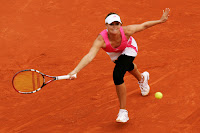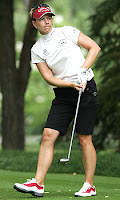
Also, while I know commentators are not exactly skilled in pronouncing names, I would think that they would be able to differentiate between Emilie and Amelie. Cliff Drysdale kept calling Emilie Loit, Amelie throughout her second round match with Maria Sharapova.
4. Fashion Police
Maria Sharapova, Jelena Jankovic, and Ashley Harkleroad have all been spotted sporting capri length leggings during their matches. Sharapova's seemed to match her outfit a little better--though I don't think the flappers of the 20s, whose outfits Sharapova's seemed to be based on, would have worn leggings, more reminiscent of the 1980s. Harkleroad wore hers under her skirt which already had attached compression shorts. I can't imagine that that was comfortable. Now I know it's a little chilly and damp this week at Roland Garros but all these women played in sleeveless tops. Leggings should never have come back.
5. The crisis
All nine Americans lost in the first round at Roland Garros. So proclaimed the commentators as we watched the pitiful montage of all nine of them in their various losing moments. Frequently the fact that it's the American men's crisis got lost. American women are faring better.
So once again we get the questions: what is happening to American tennis? will American men ever succeed on clay? And the new one this year: will the Americans stop coming to Roland Garros? James Blake says, speaking only for himself, no. But I think it's a very real possibility in this age of specialization in sport. Six-year olds are picking their sport (or their parents are picking it for them) and playing it year round. So even though Roland Garros is still tennis, and their is a certain amount of prestige in winning all four slams, you have to believe that at some point Andy Roddick and Marty Fish are just going to cut their losses and focus on what they're good at--faster surfaces. It is not as if tennis has not experienced some degree of specialization already; though, to date, specialization in tennis is usually seen as less than. For example, there are the "doubles specialists"; the suggestion is there that these are the people who could not hack it mentally and/or physically as singles players. And, of course, at this time of the year we hear all about the clay court specialists who cruise up the rankings in the spring and then drop back down (usually) for the remainder of the season. The clay court specialist, as much as he is applauded for being a grinder, is generally seen as someone who does not have the power to remain competitive against big hitters on other surfaces. And sometimes they mysteriously disappear in the two weeks between the French and Wimbledon.

